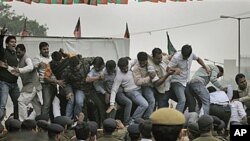India's parliament ended its winter session deadlocked over a massive corruption scandal. The government and the opposition disagree over how to investigate the allegations of graft that have erupted over the sale of telecommunication spectrum licenses two years ago.
When parliament met last month, it was scheduled to take up a host of important bills ranging from land acquisition, labor laws, to judicial accountability. Instead, its session ended Monday with little accomplished.
For weeks, opposition lawmakers disrupted parliament, chanting slogans and demanding a joint probe into the controversial sale of telecom spectrum licenses two years ago by former telecommunication minister A. Raja.
The government has turned down the demands. It said the federal investigative agency is already probing allegations that the spectrum was sold at less-than-market-prices resulting in losses of about $39 billion to government revenues.
The government says the minister has resigned, and the Supreme Court is monitoring the probe. The opposition, though, says it has no faith in the investigation by the government agency.
Even though the parliament session is over, it has not given up on its demands for a parliamentary probe. The leader of the main opposition Bharatiya Janata Party in the lower house of parliament, Sushma Swaraj, participated in a "sit-in" outside parliament. "Now, we are taking this issue to the streets, today it was the beginning."
An equally determined government has indicated it will not bend to the opposition demands.
As the political deadlock persists, concerns have been expressed that the impasse will impact democratic functioning.
The director of PRS Legislative Research, C.V. Madhukar, said the disruption of parliament presented a sorry picture.
"Several important policy proposals of the government have been delayed for some time until parliament convenes starting in February," said Madhukar. "From parliament's standpoint, it is disappointing that the ruling party and opposition parties have not been able to come together. My hope is that they will find a solution."
But the opposition is unapologetic. Lal Krishna Advani, a top leader of the opposition BJP, said, "Business not proceeding also yields results."
Disrupting parliament is an old strategy with opposition parties to pressure the government. It has seldom lasted the entire length of a parliament session. But with the government defending itself against charges of corruption, the opposition is not likely to relent. The telecom scandal is the biggest in a series of corruption scandals that have erupted in recent months.




